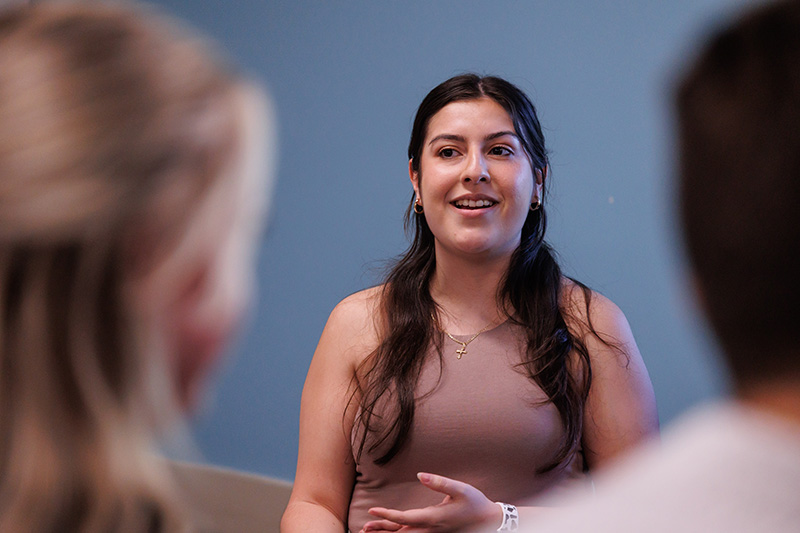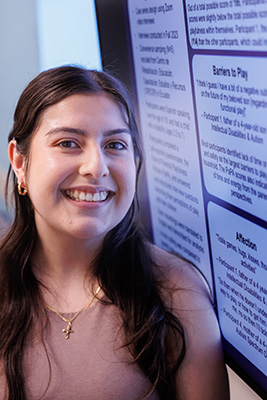
Andrea Perez, who completed her master's in occupational therapy in May 2024, was among only 30 students out of 250 institutions to receive a scholarship to attend the prestigious Institute for Future Scientists in Occupational Therapy this past April.
After growing up in Allentown with Spanish-speaking parents, Andrea Perez ’24 MSOT decided to make a career as a bi-lingual occupational therapist (OT). “I decided to pursue OT because I loved the idea of having a job that allowed me the time to sit with patients, get to know them beyond their diagnosis, and find out what is truly meaningful in life,” Perez says.
As part of her educational journey, Perez’s recent research project at Moravian University landed her a scholarship to attend the prestigious Institute for Future Scientists in Occupational Therapy (IFSOT) in Orlando, Florida, this past April. The IFSOT identifies entry-level scientists who demonstrate potential and connects them with mentors in the OT scientific community. Out of the more than 250 OT programs nationwide, only 30 students receive this honor.
Perez’s research focused on the play practices of families of underserved children with disabilities. She and her fellow researchers looked at a small population of parents and their children with disabilities who had been seen at Centro de Rehabilitación, Educación, Capacitación, Estudios y Recursos (CRECER), an outpatient center that provides free OT services to clients of all ages and disability status in Ibarra, Ecuador.

Perez and her fellow researchers planned to fly to Ibarra to experience the center in person, but civil unrest in the country prevented them from traveling to Ecuador. So, they pivoted. “We conducted interviews in Spanish with Ecuadorian parents via Zoom using a scale that measures parent playfulness attitudes,” Perez says. “We wanted to gain a better understanding of the play interactions between parents and kids, with the ultimate goal of creating OT interventions to better overcome obstacles to parent-child play and promote child development.” Their findings also gave them ideas about how to shape more culturally inclusive data collection measures in the field of OT.
Perez says she was grateful for the opportunity and honored to represent Moravian at IFSOT. “I think the Institute selected me because of my focus on making OT more inclusive, as well as my connections to other scientists in the field,” she says. “For example, in my research project at Moravian, I connected with an OT professor at the University of Puerto Rico who developed the Scale of Parental Playfulness Attitude, which we used in our research interviews. My peer and I played a critical role in data collection using the scale because we spoke Spanish, and I suspect my leading this collaboration is in part what made the institute notice me.”
She adds that partnerships such as these exemplify the foundation her education at Moravian gave her. “Moravian’s OT program promotes creativity through assignments and discussions that prompt students to consider real-life emerging practice areas where they can contribute,” Perez says. “Moravian also encourages students to develop their own hypothetical practices in non-traditional ways and to talk to individuals in the community who are making a difference in the profession.”
The experience at the IFSOT also gave Perez perspectives on where she might take her career. “I connected with bright OT students from all over the country who have their own unique ideas and aspirations, which was so inspiring,” she says. “And hearing from current leaders and researchers in the profession affirmed that innovation starts at ground zero, with a single idea. I left Orlando that weekend feeling empowered and excited for what the future holds.”
Currently working as an occupational therapist at a Lehigh Valley Health Network outpatient pediatrics clinic in Trexlertown, Pennsylvania, Perez hopes to pursue leadership opportunities to progress the OT profession and to make a difference in patients’ lives. “The emphasis on client-centered care and dignity-restoring practice is what drew me into wanting to be an OT,” she says. “I plan to advocate for my clients and their families, so they can feel empowered to take control of their health, and I would like to create more educational resources and promote health literacy for people whose first language is not English.”—Elizabeth Shimer Bowers